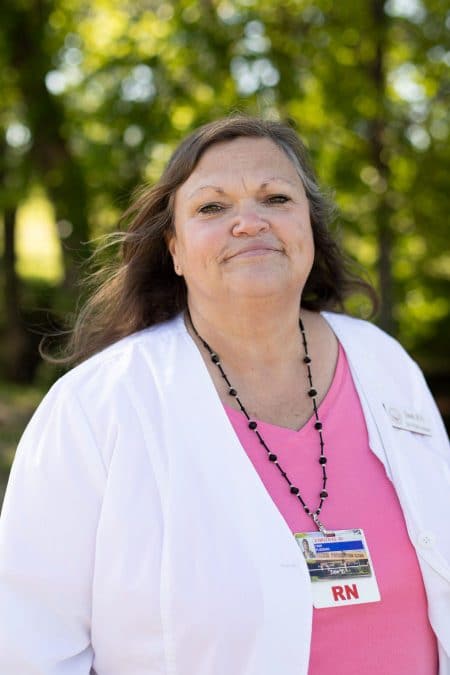Tami Fleeman’s nearly three decades as a nurse has allowed her to see the career from every angle — intensive care units, labor and delivery, and elderly patients. During her time as coordinator of Citizen Potawatomi Nation’s Title VI and senior care program, Fleeman has become a leader in her field. She offers guidance to several organizations in an effort to improve elder care across Oklahoma and Indian Country.
CPN initially hired Fleeman as coordinator of public health and community health representatives in 2011. Six months later, she received an additional title as coordinator of clinical nursing. Shortly after, the Tribe then offered her the unique opportunity to manage Title VI while still overseeing the CHRs, also known as “senior support.” Previously separate, the two programs combined under Fleeman’s leadership.

“They blend really well together because a lot of the people we have come eat (at the Elder Center) are also people that the community health representatives visit in their home,” Fleeman said. “And if we don’t visit them, I know when they’re not coming; they’re having some illness, or they’re having some issues. And then I can get the community health representatives to check with them.”
CHRs visit elders who need some assistance with certain tasks or keeping their medications in order but not full-time care.
“We do everything we can to assist them. The department’s mission is to keep people in their homes as long as they are safely able to stay there. And a lot of times, we have to implement changes to keep them there,” Fleeman said.
Title VI has expanded in the last decade, welcoming more elders for lunch and interaction on weekdays, thanks to Fleeman and other CHRs’ efforts to spread the word about the activities and services available to their clients.
CHR conference
For the last several years, Fleeman has attended and helped organize the annual weeklong conference for the Oklahoma Area Association of CHRs. The only local conference of its kind, it regularly attracts between 100 and 125 attendees who work for tribes across the country, including New Mexico, Arizona and Montana.
“Meeting people that do the same thing you do and having fun with them. You know, there’s always a lot of talk of, ‘what we’ve done in this tribe’ and ‘that hasn’t worked for us, so we did this,’” Fleeman said. “It’s an honor to be part of that because I know how important the conference is.”
Fleeman is currently running unopposed for the position of vice president of the organization. She views the leadership role as a chance for networking and a special look into how other tribes run their CHR departments. Each one focuses on different populations or goals, depending on their community’s needs. Elders with decades of experience in the field make up the majority of the Oklahoma association. While Fleeman’s experience is in health care, she began working with CHRs only eight years ago.
“You’re just coming into a situation and learning about what it is they do,” she said. “I always think that elders give a lot back, and they’re a wealth of knowledge. There’s a lot of question and answer.”
Dementia training development
Caring for and ensuring the safety of patients with Alzheimer’s and dementia presents unique challenges in geriatrics. The University of Oklahoma Health Sciences Center received a U.S. Department of Health and Human Services grant in summer 2019. Part of it funds developing training available nationwide for primary caregivers on how to better treat and interact with dementia patients. The OHSC welcomed Fleeman to give her recommendations and opinions on the curriculum as part of a group of professionals, including CHRs.
“They really listen to the suggestions we give them because we’re actually doing that job,” she said. “I’ve been impressed that a lot of the things we suggest, they take and make those changes. And I feel like they’re really trying to listen to the frontline workers and fit the education to what they need.”
The program also sought tribal caregivers in particular due to their regard for elders and the use of CHRs. Although she is not Indigenous, Fleeman enjoys working for the Nation and developing the curriculum given her personal history with the condition. Her mother was diagnosed with dementia, and Fleeman admires how Natives prioritize and respect older relatives.
“I’ve seen people quit their job and move from out of state to come live with dad when he started failing or getting dementia, and it just wasn’t safe anymore or moved them to where they are,” she said. “They take care of their elders much better than the general population.”
After decades in ICUs and labor and delivery in several hospitals, she never anticipated making elder care a career niche.
“It wasn’t something that I really thought about doing, and I love it. I absolutely love it,” Fleeman said. “I feel like I’m really able to help people stay in their homes as long as possible or get the care that they really need. It’s very rewarding.”
Find out more about CPN’s Title VI program at cpn.news/elders.
